| President
Truman and the Atomic Bomb!!
This
exposé is definitely under construction—last updated on
October 29, 2004.
| 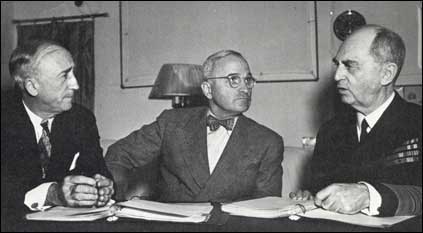
|
|
July 8, 1945—Admiral
Leahy and Secretary of State Jimmy Byrnes with President Truman
aboard the Augusta on their way to Potsdam, Germany.
This was the most momentous time in the history of world . . .
and Truman was hustled out of the country. Leahy, Byrnes
and Groves wanted to prevent him meeting with the atomic scientists
who invented the bomb.
On July 17,
1945, the atomic bomb was tested for the SECOND time in Alamogordo,
New Mexico.
The Pentagon
was frantic to get Japan to surrender before the Russians
entered the war and they were itching to use their new
super weapon to force the Japanese to surrender!! |
President Truman
was one of the greatest U.S. Presidents!!
President
Truman was one of the greatest U.S. Presidents. He blocked Jimmy
Byrnes and Nelson Rockefeller from stealing the Presidency by sneaking
in the back door through the State Department and he stood up to the
Pentagon and General MacArthur.
President
Truman's reputation has been tarnished however by the dropping of 2
atomic bombs on Japan in August 1945. Many people say that the war was
almost over and that the use of the bombs was unnecessary.
President
Truman knew NOTHING about the Manhattan Project because Roosevelt HATED
him and never took him into his confidence or prepared him in any way
to assume the duties of President. Truman was informed of the existence
of the BOMB by James F. Byrnes—his future Secretary of State....President
Truman became President at the worst possible time in the history of
the world.
| 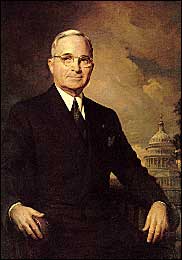
President
Harry Truman (1883-1972).
President from 1945 to 1953. |
|
In
April 1945, President Roosevelt was assassinated and his Vice
President Harry Truman became President.
Roosevelt
HATED Harry Truman and never took him into his confidence or prepared
him in any way to assume the duties of President. President Truman
described Roosevelt as "the coldest man I ever knew."
Next in line
to the Presidency after Truman was the Secretary of State.
Nelson
Rockefeller crept into the State Department in 1943
and was Under Secretary of State after the forced resignation
of Sumner Welles.
IN 1947, President
Truman had Congress change the succession back to the way it was
in 1792 except that the Speaker of the House was next in line
. . . then the President of the Senate.
Rockefeller's
Standard Oil Co., was the main financier of Nazi Germany and Imperial
Japan. |
The
Genzai Bakudan—Japanese Atomic Bomb!!
| 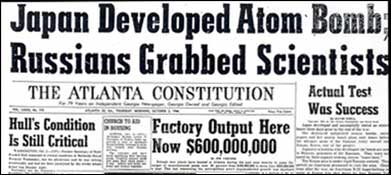
Headlines
from the Atlanta Constitution
newspaper on Oct., 3, 1946. |
|
Japanese
scientists successfully tested an atomic bomb just days after
the dropping of the atomic bomb on Hiroshima.
The bomb was
manufactured in Konan, Korea, amid the strictest secrecy.
The bomb was
an exact duplicate of the U.S. atomic bomb except the firing mechanism
on the bomb differed.
The
atomic bomb project was started in Japan , but its removal to
Korea was necessitated when the B-29's began to bomb industrial
cities on the mainland of Japan. |
Japanese
atomic bomb was exact duplicate of U.S. atomic bomb!!
Leon
Thompson was a medical technician in Tokyo, Japan. He described a diagram
of the Japanese atomic bomb and it was exactly like the U.S. bomb:
"One
hot summer day in the park outside Japan's Imperial Palace, I met
up with Mr. Papps, an OSS Officer. His office was just a few yards
down the hallway from Gen. MacArthur's office and he invited me to
see his office. As I walked into his office, I saw three top American
atomic scientists going over a large diagram of some kind of device.
I asked Mr. Papps what it was and he said it was the actual diagram
of the Japanese atomic bomb. I asked him if it was workable. He said,
"Yes." "It
was just like ours and very workable." He also showed
me some Japanese orders to use the bomb on the Allies when they came
into Japanese waters; how they would do this was not explained."
(Military Magazine,
p. 37).
The
3 men behind the dropping of the atomic bombs!!
These
3 men were behind the dropping of the atomic bombs on Japan. All 3 were
fanatical Fatima crusaders who HATED Russia and wanted to keep her out
of the Far East. They knew PERFECTLY well that Japan was defeated when
Germany surrendered in April, 1945. Stalin promised Roosevelt at Yalta
that Russia would declare war on Japan 3 months after Germany was defeated.
Immediately after the Nazi surrender, the
hugh Soviet armies were deployed to the Far East.
All
3 of these men had perfect disguises.... Leahy and Byrnes were Irish
Roman Catholics who converted to the Episcopal congregation
while Groves was the son of a Presbyterian minister and Army
Chaplain:
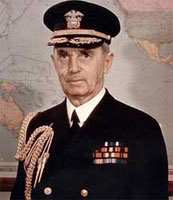
Fleet
Admiral William D. "Bill" Leahy
(1875-1959).
This
man was Chairman of the Joint Chiefs of Staff and had an office
in the East Wing of the White House next to Byrnes.
He
was the highest ranking military officer in the Roosevelt Reich
and he was boss of Groves and "Deak"
Parsons.
|
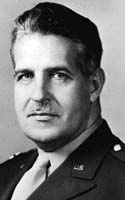
General
Leslie R. "Dick" Groves
(1896-1970).
This
man built the Pentagon and then became overseer of the Manhattan
Project to build the atomic bomb.
He had a perfect disguise. His father was a Presbyterian
minister and Army Chaplain who forgot to teach
his son ANYTHING about the Bible!!!!!
|
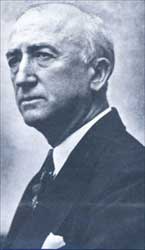
James
F. "Jimmy" Byrnes
(1882-1972).
This
man was Secretary of State under Truman from July 3, 1945 to
Jan. 1947.
Byrnes
was a Senator from South Carolina; a Supreme Court Judge, and
director of the Office of War Mobilization before becoming Secretary
of State. He was referred to as the "Assistant President."
|
President
Roosevelt was willing to receive a delegation of atomic scientists!!
Groves
and Byrnes were DETERMINED that the bomb would be used to frighten
the Russians and keep them out of the Far East. Professor ALBERT EINSTEIN
wrote a letter to Roosevelt and urged him to receive a delegation
of atomic scientists from the University of Chicago. One of them was
Leo Szilard:
"The
purpose of this letter was to introduce Szilard to the president and
to ask Roosevelt to read a memorandum on the atomic bomb prepared
by Szilard. Einstein, who as a result of Groves' misgivings about
his political and religious beliefs was not a major participant in
the Manhattan Project, trusted Szilard's opinions; for security reasons
Szilard could tell his friend Einstein "only that there was trouble
ahead" regarding the use of the atomic bomb, which
needed to be communicated directly to the president through nonmilitary
and nonpolitical channels. Einstein wrote the letter to the
president's office that Szilard requested, the two physicists hoping
that Einstein's prestige would guarantee that Szilard's memorandum
would reach Roosevelt."(Robertson,
Sly and Able: A Political Biography of James F. Byrnes, p. 400).
James
F. Byrnes refers to this same letter in his biography:
"A
few days after the committee was appointed, President Truman referred
to me a letter addressed to President Roosevelt by Dr. Albert Einstein,
dated March 25, which was in President Roosevelt's
office at the time of his death at Warm Springs. In it Dr.
Einstein requested the President to receive Dr. L. Szilard, "who
proposes to submit to you certain considerations and recommendations."
After citing Dr. Szilard's reputation in the scientific field, Dr.
Einstein went on to say that Dr. Szilard was concerned about the lack
of adequate contact between the atomic scientists and the Cabinet
members who were responsible for determining policy. Dr. Einstein
concluded with the hope that the President would give his personal
attention to what Dr. Szilard had to say" (Byrnes,
All In One Lifetime, p. 284).
President
Roosevelt never met the atomic scientists . . . because he was murdered!!
Once
the dogs of war are unleashed; nobody can foretell what the outcome
will be....President Roosevelt made an appointment to meet Leo Szilard
on May 8th, 1945:
"It
worked; the White House, after receiving the letter of introduction,
set an appointment for Szilard to present his memorandum on May 8.
Szilard was in his office at the University of Chicago on April 12,
looking over a final revision of his views for Roosevelt's reading,
when there was a knock at the office door. Another member of the Manhattan
Project told Szilard that he had just heard on the radio that FDR
had died." (Robertson, Sly and Able: A Political
Biography of James F. Byrnes, p. 400).
White
House physician says Roosevelt was in good health on April 12
Agreeing
to meet a delegation of scientists who opposed the atomic bombing of
Japan was a death warrant for Roosevelt....Roosevelt traveled to Warm
Springs, Georgia in late March to take a vacation and RECOPERATE from
the stress of his 14,000 mile round trip to Yalta to meet Churchill
and Stalin:
Dr.
Ross T. McIntyre was the White House physician in charge of President's
Roosevelt's health:
"When
Dr. Bruenn telephoned on Thursday, April 12, his report was most optimistic.
The President had gained back eight of his lost pounds and was feeling
so fit that he planned to attend an old-fashioned Georgia barbecue
in the afternoon and a minstrel show that evening for the Foundation's
patients. Every cause for anxiety seemed to have lifted, and given
another lazy, restful week, there was no reason why he should not
return to Washington on April 20 to greet the Regent of Iraq."(McIntyre,
White House Physician, p. 240).
Jimmy
Byrnes talked to the President via telephone a few days before his death
on April 12:
| 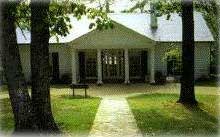
Roosevelt
cottage in Warm Springs, Georgia, where he died from food poisoning
on April 12, 1945.
He was only
63 years old!! |
|
"To
this I can only give my opinion at the time. On several occasions
late in 1943 the President did look tired and overwrought, but we
were all familiar with his remarkable capacity to "bounce back."
This expression reminds me of a phrase often used by his personal
physician, Dr. Ross McIntire, who had him under daily observation:
"That man is like a rubber ball." I now realize that we
were perhaps too close to Mr. Roosevelt to note the deterioration
observed by those who saw him less frequently. Even
a few days before his death, when I telephoned him at Warm Springs
and he told me he felt much better, I thought from his voice and
the pungency with which he expressed his views that he had again
bounced back. This may help to explain why, little more than
a year before this, his friends had not questioned the wisdom of
his decision to run again." (Byrnes, All In One Lifetime,
p. 217). |
President
Truman put James F. Byrnes in charge of the atomic bomb committee!!
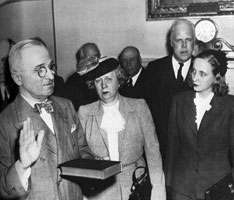
President Truman
took the oath of office as the 33rd President of the U.S. on April
12, 1945. |
|
The
new President was simply overwhelmed by his new responsibilities.
Nothing had prepared him for such a moment. Truman said "I
felt like the moon, the stars and all the planets had fallen on
me."
He
appointed James F. Byrnes as Secretary of State replacing Edward
Stettinius. When Truman heard of the atomic bomb from Byrnes he
appointed an Interim Committee to advise him on the bomb—with
Byrnes as its head!!
In
1944, Brynes was actually the Vice-Presidential candidate instead
of Truman. Byrnes was not nominated because he was unacceptable
to blacks because of his racist views.
Byrnes
felt that HE should be the one taking the oath of office . . .
instead of Truman.
|
Truman
told the atomic scientists to "go see Byrnes."
President
Truman was certainly in over his head and he made Byrnes the head of
an Interim Committee to advise him on the new super weapon:
"President
Truman asked me to see Szilard, who came down to Spartanburg, bringing
with him Dr. H. C. Urey and another scientist. As the Einstein letter
had indicated he would, Szilard complained that he and some of his
associates did not know enough about the policy of the government
with regard to the use of the bomb. He felt
that scientists, including himself, should discuss the matter with
the Cabinet, which I did not feel desirable. His general demeanor
and his desire to participate in policy making made an unfavorable
impression on me, but his associates were neither as aggressive
nor apparently as dissatisfied.
In response to his statement that the younger scientists were very
critical of Doctors Bush, Compton and Conant, I asked him his opinion
of Oppenheimer. He quickly expressed enthusiastic admiration. I told
him then that he should feel better because the following week, upon
the suggestion of the three scientists about whom he complained, Dr.
Oppenheimer would meet with the Interim Committee. This pleased Szilard
and his companions, and the conversation passed to a more general
discussion of atomic matters. What they told me did not decrease my
fears of the terrible weapon they had assisted in creating.
These oppressive thoughts, and the burden of security, made themselves
felt in meetings of the Interim Committee. A
few days later, when I mentioned to General Groves the scientists'
visit to Spartanburg, he told me that he already knew of it; that
one of his intelligence agents had been following the three gentlemen,
as they followed others connected with the project. The diligence
of Groves impressed me then as it had done before" (Byrnes,
All In One Lifetime, pp. 284-285).
Byrnes
recommended the use of the bomb without any warning!!
Before
other bombing raids over Japan, the Pentagon had dropped leaflets warning
the Japanese that an air raid was coming. Byrnes was totally against
any warning. The Japanese were willing to surrender after Germany's
defeat . . . if they could keep the Emperor. If not they were willing
to fight to the death . . . and use their own atomic bombs on the invaders:
"On
June 1, 1945, our Interim Committee unanimously recommended to President
Truman that the bomb should be used without specific warning and as
soon as practicable against a military installation or a war plant
in the Japanese islands. It had been suggested that it first be used
against an isolated island with representatives of Japan and other
nations invited to observe the test. This alternative was rejected.
There was also the question of giving the Japanese fair warning about
the time and place of the explosion; but because we felt that American
prisoners of war would be brought into the designated area, this idea
was not adopted. We were also told by the experts that whatever the
success of the test bomb, they would not guarantee that another would
explode when dropped. Further, if we gave the Japanese advance notice
and then the bomb failed to explode, our optimism would have only
played into the hands of the Japanese militarists."
(Byrnes, All In One Lifetime, p. 285).
Atom
bomb cost 20 BILLION Dollars to develop!!
The
atom bomb cost 2 BILLION (20 BILLION in today's dollars) to develop
and over 200,000 people worked for 3 years on the Manhattan Project.
It was the largest and most expensive industrial project ever undertaken
in the entire history of the world:
"In
fact, S-1 was the largest scientific-industrial undertaking in history,
and the most important and best-kept secret of the war. Overall responsibility
had been given to the Army Corps of Engineers, with Groves, who had
overseen the building of the Pentagon, in charge. It had been launched
out of fear that the Nazis were at work on the same thing, which they
were, though with nothing like the seriousness or success that were
imagined. In less than three years the United States had spent $2
billion, which was not the least of the hidden costs, and, one way
or other, 200,000 people had been involved, only a few having more
than a vague idea of what it was about. That the diligent chairman
of the Truman Committee had known so little was a clear measure of
how extremely effective security had been. But then neither did General
MacArthur or Admiral Chester A. Nimitz or a host of others in high
command know what was going on.
While the United States and Great Britain shared in the secret and
technical-scientific details, it was in all practicality an American
project—initiated, supervised, financed, and commanded from
Washington. Ultimately it was Franklin Roosevelt's project, his decision,
his venture. Without his personal interest and backing it would never
have been given such priority. For Truman it was thus another part
of the Roosevelt legacy to contend with and again Roosevelt was of
little help to him. Roosevelt had left behind no policy in writing
other than a brief agreement signed with Churchill at Hyde Park the
previous autumn saying only that once the new weapon was ready, "It
might perhaps, after mature consideration, be used against the Japanese,
who should be warned that this bombardment will be repeated until
they surrender." (McCullogh, Truman, pp. 378-379).
In
1944, General Groves estimated that it would take the Soviets 20 years
to develop the bomb. Little did he realize that they would have it within
a year— and for FREE!!
All
the trouble in Japan started in 1549!!
| 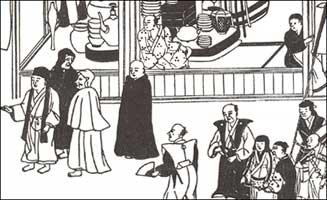
Jesuits
in Japan.
Japanese representation from the 16th century. |
|
All
the trouble in Japan started exactly 400 years prior to the beginning
of World War II in 1939. That was the year that Jesuit Francis
Xavier entered Japan with his counterfeit"Christianity."
The Japanese Emperor, Daimyo Nobunaga, welcomed him and gave him
carte blanche to spread his false "gospel"
throughout Japan.
The Emperor
soon learned however that Jesuit "missions" were just
a pretext for a later military conquest by Spain and Portugal.
It would be a repetition of what happened to the native populations
in the New World who were decimated by these Conquistador "converters."
The Japanese did not possess the advanced weapons of the European
nations and would soon have ceased to exist as a nation. As a
result, ALL foreigners (except the Dutch) were forbidden to visit
Japan upon pain of death. |
Jesuits
reentered Japan disguised as Moslems!!
The
Jesuits reentered Japan disguised as Moslems after the fall of the Papal
States in 1870. In all recorded history prior to that time, Japan had
never invaded another country. They wanted NOTHING whatsoever to do
with foreigners because of the poisoning of their minds against Christianity
by the Jesuits:
"The
writer was told by a Christian Japanese minister in charge of a Protestant
mission in Los Angeles in reply to the question as to why the Jesuits,
who had been barred for years from Japan, had now been permitted to
enter. He. answered that the Roman Church had gotten into his country
under the guise of Mohammedanism, and that after it was well entrenched
threw off its disguise, and his country learned to its astonishment
that it was to the Roman Church and its monastic orders it had opened
its doors" (Suppressed Truth About the Assassination of Abraham
Lincoln, p.12).
In
the Russo-Japanese war of 1904, Japan destroyed most of the Russian
Far Eastern fleet. This set Japan on a collision course with Russia
over control of Manchuria.
The
Axis of Evil in 1939
Just
before World War II erupted, the axis of evil consisted of 6 world leaders.
They were: Roosevelt, Hitler, Mussolini, Pius XII, Franco of Spain and
Hirohito of Japan.
| 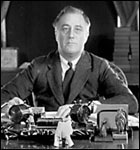
FDR,
Dictator of the U.S. |
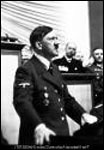
Adolf Hitler,
German Reich Fuehrer.
|

Benito Mussolini,
Italian Fascist Dictator.
|
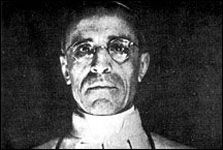
Pius XII,
Bishop of Rome and fanatical Fatima Crusader.
|
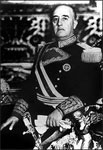
Generalissimo
Francisco Franco, Dictator of Spain.
|
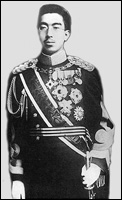
Emperor
Hirohito of Japan.
|
|
The
Final Target of these Fatima Crusaders was Russia
| 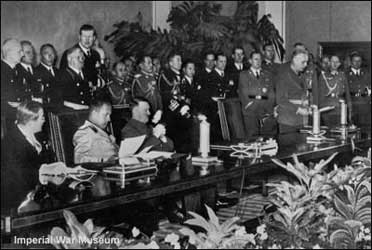
In Sept. 1940,
Japan, Italy and Germany signed the Tripartite Pact. |
|
In
the Spring of 1941, Hitler was ready to invade the Soviet Union
with the largest invasion force in the history of the world. This
invasion force was supplied with oil by the Rockefeller owned
Standard Oil Co., and trucks by the Ford Motor Co.
While Hitler
attacked from the West, Japan was supposed to attack Russia from
the East.
The Japanese
were afraid to attack Russia because they had a very healthy respect
for the Russian army after the Russians annihilated a Japanese
army in Manchuria in August 1939. Hitler never sent observers
to that battle because he had nothing but disdain for the fighting
ability of the Russian Army. |
Roosevelt
was furious when Japan refused to attack Russia
Fuehrer
Franklin was furious when Japan refused to attack Russia. His
advisers told him that unless Japan opened a second front in the East,
the Nazi hordes would be swallowed up in the vastness of Russia and
Hitler might lose the war. He also needed a war in order to serve a
fourth and fifth term as President. This would allow him to pack the
Supreme Court with his cronies in order
to destroy the Constitution.
He
maneuvered the Japanese into attacking the U.S. Pacific Fleet at Pearl
Harbor and Japan and the U.S. were at war . . . instead of Japan and
Russia.
Spanish
spy network in the U.S.
Officially
Spain was neutral in World War II. Behind the scenes however, she was
anything but neutral. Caudillo Franco ordered his best spies in the
U.S. to report every move that the U.S. military was making
against Germany and Japan.
| 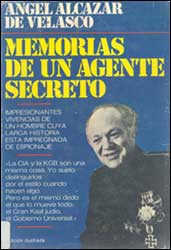
Angel Alcázar
De Velasco was Spain's top spy in charge of U.S. espionage. |
|
Angel
Alcázar de Velasco was an ex-bullfighter and a leader of
the Falange in Spain.
When the Japanese
embassy in Wash., D.C. was vacated by the Japanese in 1941, the
embassy was taken over by Spain. The Japanese left a vast amount
of money to set up a spy network in the U.S. called TO.
The new Spanish
occupied embassy had a radio transmitter and regularly sent reports
in code to Madrid and the Vatican. These reports were then relayed
to Berlin and Tokyo.
Al least 10,000
of such radio intercepts were on file in the U.S. War Department.
The secrets
of the Manhattan atomic bomb project were sent to Tokyo via Madrid
using this secret code. |
De
Velasco was "a cunning and dangerous agent"
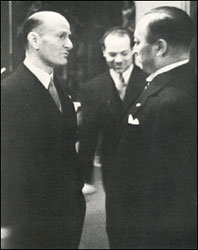
Angel
Alcázar de Velasco (center) with the ambassadors of Italy
and Japan during a reception in Berlin.
|
|
Robert
K. Wilcox in his eye-opening book: Japan's Secret War,
interviewed Alcázar de Velasco at his home in Madrid and
he says this about Spain's top secret agent:
"Alcázar
de Velasco does have some corroboration beyond his own words.
Both Ladislas Farago and J. C. Masterman, high up in Allied intelligence
during World War II, wrote that the Germans found out about our
atomic bomb project and that Alcázar
de Velasco was a cunning and dangerous agent. The late
Farago, who worked for American intelligence, wrote about him
in The Game of the Foxes; Masterman, a leader in British
intelligence and also dead, in The Double-Cross System in
the War of 1939 to 1945. The FBI has perhaps 10,000 pages
of files on Alcázar de Velasco and TO (which it calls Span-Jap).
I had still not received them under my Freedom of Information
Act request when I conducted my interview. All I could get was
a phone report that the files contained "real hot stuff."
(Japan's Secret War, p. 33). |
J.
Edgar Hoover sabotaged surveillance of Spanish embassy!!
U.S.
Counter Intelligence (OSS) founded by a man named William (Wild Bill)
Donovan was the forerunner of the CIA. Donovan wanted to keep the so-called
neutral embassies neutral so he placed them under
surveillance. He was thwarted in his efforts to observe the Spanish
embassy by none other than J. Edgar Hoover's Federal Bureau of Inquisition:
"In
the summer of 1942, six months after Pearl Harbor, a team of American
secret agents took on a highly sensitive mission. Contrary to all
international rules, they were to steal the secret codes used by the
embassies of neutral countries that favored Germany. This involved
breaking in at dead of night, cracking safes, photographing codebooks
and escaping without getting caught.
Working under Edgar's rival William Donovan, the team pulled off this
feat several times. Late one night, however, when
the agents were inside the Spanish embassy in Washington, two FBI
cars screeched to a halt outside and very deliberately turned on their
sirens and flashing lights. Donovan's men had to abort the operation,
and several of them were arrested. Donovan
had no doubt that Edgar was personally responsible.
It had not been enough for Edgar to have control of intelligence operations
throughout Latin and Central America. He had been enraged because
Donovan, now a general, had been appointed head of the wartime intelligence
body, the Office of Strategic Services, and he was obstructing him
at every opportunity. "The Abwehr," Donovan commented, "gets
better treatment from the FBI than we do." Donovan's Spanish
embassy operation cut across existing FBI surveillance, so Edgar simply
sabotaged it. On the eve of the landings in North Africa, his action
came close to exposing vital Allied operations.
The agent who led the break-in, Donald Downes, later recalled how
Donovan protested to the White House—to little avail. "No
President," one of his aides commented, "dare touch John
Edgar Hoover. They are all scared pink of him." "We
had taken all imaginable precautions," Downes lamented, "all
except one—the possibility of betrayal by someone high enough
in the American government to know what we were doing." (Official
& Confidential, pp. 137-138).
The
real reasons why the Pentagon dropped the bombs on Japan!!
On
August 8, 1945, Russia declared war on Japan. Russian armour came
racing down from the north through Manchuria. In a matter of days
they had defeated the million man Japanese Kwantung Army and were
poised to invade Korea. The Japanese atomic bomb project was located
near the Chosen Reservoir.
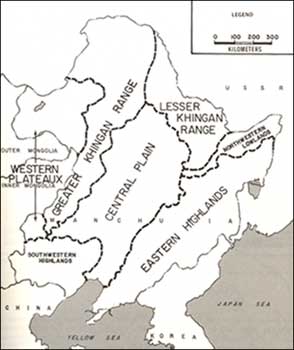
Manchuria
is about 4,400 kilometers (2,700 miles) from top to bottom.
The Soviets, by a combined operation of land, sea and air reached
Korea in 11 days!! |
|
"Shortly
after midnight on 9 August 1945, assault parties of Soviet troops
crossed the Soviet-Manchurian border and attacked Japanese positions
in Manchuria. This was the vanguard of a force of more than
1.5 million men that was to advance along multiple axes on a
frontage of more than 4,400 kilometers, traversing in its course
virtually every type of terrain from the deserts of Inner Mongolia
to the shores of the Sea of Japan. Thus began one of the most
significant campaigns of World War II "(August Storm,
intro).
This operation
makes MacArthur's landing at Inchon look like CHILDS PLAY. Mac
Arthur probably studies this campaign before he attacked North
Korea in 1950.
When the
North Korean invasion began to go badly for MacArthur, he BEGGED
President Truman to bail him out by authorizing the use of atomic
weapons against the Chinese!! |
The last thing
the Pentagon wanted was for their ally Russia to obtain
the secrets of the atomic bomb. They insisted that Japan surrender
immediately or face utter destruction. The Japanese held out hoping
to use their atomic bombs to stop a U.S. invasion.
They longer
they held out the closer the Russians got to Korea. In exactly 11
days the Soviets wiped out the million man Kwantung Army.
Eventually the
Russians managed to invade North Korea, capture all the bomb-making
facilities, and ship the Japanese scientists to Moscow. The 20 BILLION
dollar Pentagon super weapon had fallen into the hands of the Russians!!
The
German Atomic Bomb
Work
on the German atomic bomb was carried out at the Kaiser Wilhelm
Institute for Physics in Berlin. Madrid shared the Manhattan atomic
bomb project secrets with Tokyo and Berlin. A German submarine
named U-234 left Germany in March, 1945 bound for Tokyo. On board
was 1,120 pounds of uranium oxide— enough uranium to make
two atomic bombs. The sub was forced to land at Portsmouth, New
Hampshire after Hitler surrounded in April.
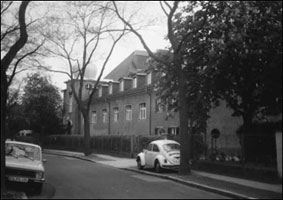
Kaiser
Wilhelm Institute of Physics in Berlin was the center of German
atomic bomb research. It was the FINAL TARGET of Russia in
the Battle of Berlin. |
|
The
Russians were determined to capture Berlin at ALL costs before
the Allies because they hoped to get the bomb secrets from
the Germans.
Over 700,000
Russians died in the Battle of Berlin but most of the atomic
bomb making equipment was moved to Haigerloch in the Black
Forest.
The Russians
came up with nothing in their capture of Berlin but they were
determined not to fail with Japan.
Even thought
the Russian suffered enormous casualties in the Battle of
Berlin, they shared the city with the Allies e.g.,, Great
Britain, France, U.S. The U.S. refused to let Russia have
any part in the occupation of Japan because they feared that
Russia might get some of the atomic bomb secrets. |
The
Korean War
| 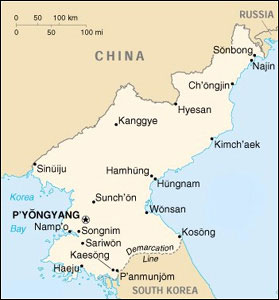
The vast
Japanese hydroelectric atomic bomb producing facilities at
Hungnam (Hunan) were captured by the Russian in August 1945.
|
|
The
Pentagon was FURIOUS when their ALLY Russia obtained the atomic
bomb "know-how" for FREE.
The bomb
had cost 2 BILLION Dollars ($20 BILLION in today's dollars)
to produce and the Roosevelt Reich
wanted an exclusive worldwide monopoly on this unique weapon
of mass destruction.
By dropping
the bombs on Japan, the Pentagon had demonstrated its willingness
to use this terror weapon to impose a Pax Americana on the
rest of the world.
With Russia
now a potential member of the exclusive nuclear club their
plans were going awry.
All was
not lost however. The Roosevelt Reich was still determined
to stop Russia becoming a member at all costs. The Korean
War was the result of his Pentagon "admit NONE"
policy. |
President
Truman stood up to the Pentagon and MacArthur
The faked North
Korean invasion of South Korea began on Sunday, June 25,
1950. Soon the war began to get out of control with Emperor MacArthur
seeking to override his Commander in Chief, President Truman. Thank
God Truman had him FIRED and spared the world from World War III.
| 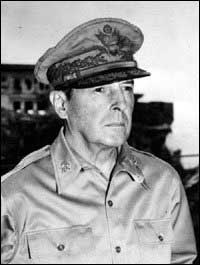
Emperor
MacArthur (1880-1964), was commander of the Roosevelt Reich
forces in the invasion of North Korea to capture the uranium
mines and atomic bomb making facilities of North Korea. |
|
Emperor MacArthur was not so "gung-ho" when it came
to fighting Japanese but nothing could stop him when it came
to fighting "COMMIES."
He abandoned
the Philippines and his own army to the brutal Japanese in
1942 and ran of to Australia after promising to return "some
day."
It took
him 31/2 years to cross the Pacific while Russia defeated
a million man Japanese army in a matter of DAYS.
In 1951,
he BEGGED President Truman to bail him out of the North Korean
disaster by authorizing the use of atomic weapons against
the Chinese.
If President
Truman had not fired the firebrand, WW III would have started
in 1951.
He was
a "momma's-boy" with a particular hatred for Soviet
Russia. In 1952, he planned on running for President against
President Truman.
Thank
God this old soldiers did finally fade away in 1964. |
President
Truman fired Emperor MacArthur and saved the world from World War
III
| 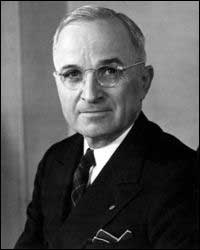
President
Truman fired Emperor MacArthur on April 11, 1951 thus saving
the world from WW III.
The Emperor
ignored the fact that the President was Commander-in-Chief
of the Armed Forces. He wanted to nuke China and
Russia while the Pentagon still had the monopoly on nuclear
weapons. |
|
President
Truman grew tired of the insubordination of the Emperor and
finally fired him in April 1945. He is the text of his
farewell massage to MacArthur:
"With
deep regret I have concluded that General of the Army Douglas
MacArthur is unable to give his wholehearted support to the
policies of the United States Government and of the United
Nations in matters pertaining to his official duties. In view
of the specific responsibilities imposed upon me by the Constitution
of the United States and the added responsibility which has
been entrusted to be by the United Nations, I have decided
that I must make a change of command in the Far East. I have,
therefore, relieved General MacArthur of his commands and
have designated Lt. Gen. Matthew B. Ridgway as his successor.
Full and
vigorous debate on matters of national policy is a vital element
in the constitutional system of our free democracy. It
is fundamental, however, that military commanders must be
governed by the policies and directives issued to them in
the manner provided by our laws and Constitution. In
time of crisis, this consideration is particularly compelling.
General
MacArthur's place in history as one of our greatest commanders
is fully established. The Nation owes him a debt of gratitude
for the distinguished and exceptional service which he has
rendered his country in posts of great responsibility. For
that reason I repeat my regret at the necessity for the action
I feel compelled to take in his case."
Order
by the President to General MacArthur: |
To
be continued
Vital
Links
Atlanta
Constitution Atomic Bomb Articles
Atomic
Bomb Article from Military Magazine
Rockefeller's
University of Chicago built the atomic bomb!!
Vietnam
Why Did We Go? by Avro Manhattan
References
Alperovitz,
Gar. The Decision to Use the Bomb. Alfred A. Knopf, New York
1995.
Byrnes,
James F. All In One Lifetime, Harper & Brothers, New
York, 1958
Beevor,
Antony. The Fall of Berlin 1945. Viking Press, New York,
2002.
Brown,
Anthony Cave. The Secret History of the Atomic Bomb. The
Dial Press, New York, 1977.
Cook,
Fred J. The FBI Nobody Knows. The Macmillan Company, New
York, 1964.
Chase,
Alan. Falange: The Axis Secret Army in the Americas. G. P.
Putnam's Sons, New York 1943.
Compton,
Arthur Holly. Atomic Quest. Oxford University Press, New
York, 1956.
De
Velasco, Angel Alcázar. Memorias De Un Agente Secreto.
Plaza & Janes, S.A., Barcelona, Spain, 1979. (No English translation
is available).
Farago,
Ladislas. The Game of the Foxes: The Untold Story of German Espionage
In the U.S. and Great Britain during WW II. Bantam Books, 1971.
Glantz,
David, LTC. August Storm: the Soviet 1945 Strategic Offensive
in Manchuria, Combat Studies Institute, Fort Leavenworth, Kansas,
1983.
Hensshall,
Philip Vengance Hitler's Nuclear Weapon: Fact or Fiction?
Sutton Publishing, Gloustershire, England, 1995.
Hanson,
Bill. Closely Guarded Secrets, Xlibris Corporation, 2000.
Kato,
Masuo. The Lost War: A Japanese Reporter's Inside Story,
Alfred A. Knopf, New York, 1946. (Excellent account of Japan during
the war).
McIntyre,
Ross T., Dr. White House Physician. G. P. Putnam's Sons,
New York, 1946.
McCullough,
David. Truman, Simon & Schuster, New York, 1992. Masterman,
J. C.The Double-Cross System in the War of 1939 to 1945.
Yale University Press, 1972.
McCarthy,
Burke, The Suppressed Truth About The Assassination of Abraham
Lincoln, (privately published in 1920).
Robertson,
David, Sly and Able: A Political Biography of James F. Byrnes,
W. W. Morton & Co., New York, 1994.
Stinnett,
Robert B. Day of Deceit: the Truth about FDR and Pearl Harbor,
Free Press (a division of Simon & Schuster Inc.), New York, 2000.
Summers,
Anthony. Official and Confidential: The Secret Life of J. Edgar
Hoover. G. P. Putnam's Sons, New York, 1993.
Wilcox,
Robert K. Japan's Secret War: Japan's Race Against Time to Build
It's Own Atomic Bomb. Marlowe & Co., New York, 1995.
Copyright
© 2004 by Leon Kilkenny
Back to Main Menu
|






















